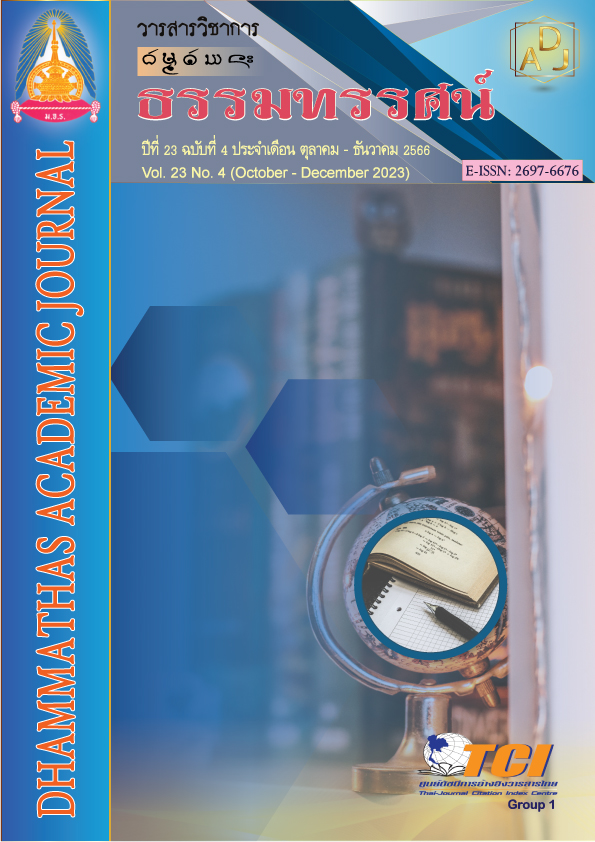Learning Leadership Development Model of School Administrators Expanding Educational Opportunities, under the Office of the Basic Education Commission in the Northeast
Main Article Content
Abstract
The purposes of this research were 1) study the components of learning leadership 2) study the needs to develop learning leadership, 3) create a learning leadership development model, and 4) study the results of using the learning leadership development model of the administrator’s educational opportunity extension schools, under the office of the Basic Education Commission in the Northeast. This research is using an integrated method. The research instruments used for this study were 1) the document analysis and semi-structured interviews were interviews with 7 experts, which were analyzed by content analysis. 2) a 5-level rating scale questionnaire, the sample group was 500 administrators of the educational opportunity extension schools for the academic year 2021, using multi-stage sampling. The questionnaire had an index of item objective congruence (IOC) between 0.80-1.00. There was an index of discrimination between 0.80-100, and a reliability of 0.98. The frequency, percentage, mean, and standard deviation were used to analyze the data. The PNI modified technique was used to analyze the order of needs.
The research findings were as follows:
1. There are six components of learning leadership: team learning, the introduction of advanced technology into the operation, creativity, an environment conducive to learning, self-directed learning, and integration.
2. The overall need for learning leadership development was 0.85 (PNI modified = 0.85). Considering each aspect in order of importance, the three rankings are as follows: Team learning (PNI modified = 0.88), followed by the use of advanced technology in operations (PNI modified = 0.87), and creativity (PNI modified = 0.86).
3. The formation and verification of the model consist of 6 elements, Principles, objectives, contents, development methods/processes, evaluations, and success conditions.
4. The pattern trial found that: 16.53 percent of administrators of the educational opportunity extension schools have progressed in learning leadership development and 22.22 percent maintain the status of learning leadership.
Article Details

This work is licensed under a Creative Commons Attribution-NonCommercial-NoDerivatives 4.0 International License.
เพื่อให้เป็นไปตามกฎหมายลิขสิทธิ์ ผู้นิพนธ์ทุกท่านต้องลงลายมือชื่อในแบบฟอร์มใบมอบลิขสิทธิ์บทความ ให้แก่วารสารฯ พร้อมกับบทความต้นฉบับที่ได้แก้ไขครั้งสุดท้าย นอกจากนี้ ผู้นิพนธ์ทุกท่านต้องยืนยันว่าบทความ ต้นฉบับที่ส่งมาตีพิมพ์นั้น ได้ส่งมาตีพิมพ์เฉพาะในวารสาร วิชาการธรรม ทรรศน์ เพียงแห่งเดียวเท่านั้น หากมีการใช้ ภาพหรือตารางของผู้นิพนธ์อื่นที่ปรากฏในสิ่งตีพิมพ์อื่นมาแล้ว ผู้นิพนธ์ต้องขออนุญาตเจ้าของลิขสิทธิ์ก่อน พร้อมทั้ง แสดงหนังสือที่ได้รับการยินยอมต่อบรรณาธิการ ก่อนที่บทความจะได้รับการตีพิมพ์References
กนกอร สมปราชญ์. (2560). ภาวะผู้นำและภาวะผู้นำการเรียนรู้สำหรับผู้บริหารสถานศึกษา. (พิมพ์ครั้งที่ 2). ขอนแก่น: คลังนานาวิทยา.
จิรวัฒน์ วงษ์คง และกนกอร สมปราชญ์. (2560). ตัวบ่งชี้ภาวะผู้นำการเรียนรู้ของผู้บริหาร สังกัดสำนักงานเขตพื้นที่การศึกษามัธยมศึกษา เขต 25. วารสารศึกษาศาสตร์ ฉบับวิจัยบัณฑิตศึกษา มหาวิทยาลัยขอนแก่น, 11(2), 48-58.
ฐิติวัจน์ ทองแก้ว และประสพชัย พสุนนท์. (2561). การวิจัยเชิงเอกสารเพื่อสังเคราะห์องค์ประกอบและวิเคราะห์ความสัมพันธ์ของแนวคิดการจัดการสมรรถนะการประกอบอาชีพของคนพิการ: บริบทของสถานการณ์ กระบวนทัศน์ และแนวคิดที่ให้ความสำคัญกับสมรรถนะของมนุษย์ทุกคน. วารสารสาขามนุษยศาสตร์สังคมศาสตร์ และศิลปะ, 11(3), 2162-2192.
นฤมล จิตรเอื้อ. (2560). บทบาทภาวะผู้นำในการพัฒนาองค์การสู่องค์การแห่งการเรียนรู้. วารสารสาขามนุษยศาสตร์สังคมศาสตร์และศิลปะ, 10(2), 1738-1754.
บุญชม ศรีสะอาด. (2545). การวิจัยเบื้องต้น. (พิมพ์ครั้งที่ 7). กรุงเทพฯ: สุวีริยาสาส์น.
_______. (2553). การวิจัยเบื้องต้น. (พิมพ์ครั้งที่ 8). กรุงเทพฯ: สุวีริยาสาส์น.
ปริญญามิตร ลีนาลาด และคณะ. (2562). รูปแบบการพัฒนาภาวะผู้นำที่มีประสิทธิผลของผู้บริหารโรงเรียนมาตรฐานสากลในภาคตะวันออกเฉียงเหนือ. วารสารบริหารการศึกษา มหาวิทยาลัยขอนแก่น, 13(1), 11-20.
พรพิพัฒน์ ตั้งจิตรวัฒนากุล. (2559). แนวทางการพัฒนาภาวะผู้นำแบบให้บริการของผู้บริหารสถานศึกษาระดับมัธยมศึกษา. วารสารมนุษยศาสตร์และสังคมศาสตร์ (สทมส.), 23(1), 38-54.
เมตตา สอนเสนา และวัลลภา อารีรัตน์. (2558). ภาวะผู้นำทางการเรียนการสอนของผู้บริหารสถานศึกษาที่ส่งผลต่อแรงจูงใจในการปฏิบัติงานของครูในโรงเรียน สังกัดสำนักงานเขตพื้นที่การศึกษามัธยมศึกษา เขต 25. วารสารศึกษาศาสตร์ มหาวิทยาลัยขอนแก่น, 38(2), 115-123.
รุ่งอรุณ บวรชัยเดช. (2560). การพัฒนาโปรแกรมเสริมสร้างภาวะผู้นำที่มีประสิทธิผลของผู้บริหารสถานศึกษาสังกัดองค์การบริหารส่วนจังหวัด. (วิทยานิพนธ์ศึกษาศาสตรมหาบัณฑิต). มหาสารคาม: มหาวิทยาลัยมหาสารคาม.
สมชาย เทพแสง. (2556). ภาวะผู้นำแห่งการเรียนรู้: รูปแบบของภาวะผู้นำสมัยใหม่. วารสารบริหารการศึกษา มหาวิทยาลัยศรีนครินทรวิโรฒประสานมิตร, 10(19), 30-41.
สุธรรม ธรรมทัศนานนท์. (2561). การพัฒนาโปรแกรมเสริมสร้างภาวะผู้นำแห่งการเรียนรู้ของผู้บริหารสถานศึกษาขั้นพื้นฐาน. วารสารวิจัยทางการศึกษา คณะศึกษาศาสตร์ มหาวิทยาลัยศรีนครินทรวิโรฒ, 13(2), 169-182.
สุนทรา โตบัว, พนิต เข็มทอง และวรัทยา ธรรมกิตติภพ. (2561). การใช้การประเมินความต้องการจำเป็นในการออกแบบการพัฒนาบุคลากรด้านการประเมินโครงการในสถานศึกษาอาชีวศึกษา. วารสารวิจัยและพัฒนาหลักสูตร, 8(2), 69-87.
สุวิมล ว่องวาณิช. (2558). การวิจัยประเมินความต้องการจำเป็น. กรุงเทพฯ: จุฬาลงกรณ์มหาวิทยาลัย.
อภิศญารัศมิ์ ประราศี. (2561). โปรแกรมเสริมสร้างภาวะผู้นำการเรียนรู้ของผู้บริหารโรงเรียน สังกัดสำนักงานเขตพื้นที่การศึกษามัธยมศึกษา. (วิทยานิพนธ์การศึกษาดุษฎีบัณฑิต). มหาสารคาม: มหาวิทยาลัยมหาสารคาม.
Brown, I. M. & Posner, B. Z. (2001). Exploring the Relationships Between Learning and Leadership. Leadership & Organization Development Journal, 22(6), 274-280.
Cronbach, L. J. (1990). Essentials of Psychology Testing. New York: Harper.
Jennings, C., & Wargnier, J. (2015). Effective learning with 70:20:10. The new frontier for the extended enterprise. Retrieved from https://alberonpartners.com/wp-content/uploads/2019/09/Alberon_Wargnier_2011-70-20-10_vEN.pdf
Marquardt, M. J. (2000). Action learning and leadership. The Learning Organization, 7(5), 233-241.
Neuman, M., & Simmons, W. (2000). Leadership for Student Learning. Phi Delta Kappan, 82(1), 9-12.
Pearson, K. (1920). Notes on the history of correlation. New York: Oxford University Press.
Posner, B. Z., & Kouzes, J. M. (1997). Ten lessons for leaders and leadership developers. Journal of Leadership Studies, 3(3), 3-10.
Scott, J. (1990). A Matter of Record, Documentary Sources in Social Research. Cambridge: Policy Press.
Tubin, D. (2013). Learning leadership for innovation at the system level: Israel. In Leadership for 21st Century Learning. Paris: OECD.
Yukl, G. A. (2010). Leadership in Organizations. (7th ed.). New Jersey: Pearson.

